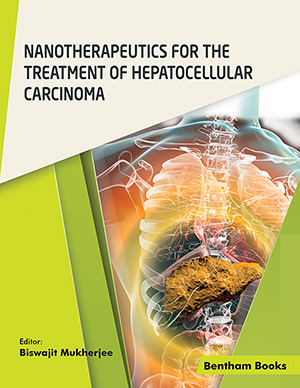Hepatocellular Carcinoma: Diagnosis, Molecular Pathogenesis, Biomarkers, and Conventional Therapy
Page: 1-97 (97)
Author: Biswajit Mukherjee*, Manasadeepa Rajagopalan, Samrat Chakraborty, Prasanta Ghosh, Manisheeta Ray, Ramkrishna Sen and Iman Ehsan
DOI: 10.2174/9789815039740122010003
PDF Price: $30
Abstract
Hepatocellular Carcinoma and Therapeutic Challenges
Page: 98-122 (25)
Author: Somenath Datta*
DOI: 10.2174/9789815039740122010004
PDF Price: $30
Abstract
Nanoformulations and Their Therapeutic Advantages
Page: 123-165 (43)
Author: D. Nedra Karunaratne*, Thusini D. Wijerathne, Nuwanthi P. Katuwavila and Geethi K. Pamunuwa
DOI: 10.2174/9789815039740122010005
PDF Price: $30
Abstract
Nanoformulations to Limit Challenges of Conventional Therapy Against Hepatocellular Carcinoma – An Overview
Page: 166-218 (53)
Author: Suresh Ajmeera and V. Badireenath Konkimalla*
DOI: 10.2174/9789815039740122010006
PDF Price: $30
Abstract
Nanotherapeutics for the Treatment of Hepatocellular Carcinoma
Page: 219-247 (29)
Author: Kishor Mazumder*, Md. Emran Hossain and Asma Aktar
DOI: 10.2174/9789815039740122010007
PDF Price: $30
Abstract
A Summarized View of Lipid, Polyplex, Inorganic, and Carbon-Based Nanotherapeutics for Hepatocellular Carcinoma Treatment
Page: 248-279 (32)
Author: Riddhi Trivedi, Sanjay Arora, Richard N. L. Lamptey, Bivek Chaulagain, Jagdish Singh* and Buddhadev Layek*
DOI: 10.2174/9789815039740122010008
PDF Price: $30
Abstract
Aptamers and Their Potential in Site-Specific Nanotherapy Against Hepatocellular Carcinoma
Page: 280-315 (36)
Author: Debasmita Dutta*, Samrat Chakraborty, Biswajit Mukherjee, Moumita Dhara and Laboni Das
DOI: 10.2174/9789815039740122010009
PDF Price: $30
Abstract
Preclinical Studies on Nanocarrier-Mediated Delivery of Radiosensitizing Agents to Brain and Pancreatic Cancer with a Future Projection to Liver Cancer
Page: 316-332 (17)
Author: Peter Sminia*, Pei Pei Che, Ben J. Slotman and Elisa Giovannetti
DOI: 10.2174/9789815039740122010010
PDF Price: $30
Abstract
Preclinical Findings for Targeted Nanotherapies to Hepatocellular Carcinoma
Page: 333-383 (51)
Author: Akhil Suresh, Chetan H Metha, Varalakshmi Velagacherla, Srinivas Mutalik, Usha Y Nayak and N. Udupa*
DOI: 10.2174/9789815039740122010011
PDF Price: $30
Abstract
Potential Nanoformulation Approaches for Delivery of HCC Therapeutic Agents
Page: 384-448 (65)
Author: Maria Lucia A.D Lestari and Biswadip Sinha*
DOI: 10.2174/9789815039740122010012
PDF Price: $30
Abstract
Recent Patents and Commercially Available Nanotherapeutics on Hepatocellular Carcinoma
Page: 449-489 (41)
Author: Susanthi Jayasinghe, Imalka Munaweera, Disni Dedunupitiya, Chamalki Madhusha, Nilwala Kottegoda and Veranja Karunaratne*
DOI: 10.2174/9789815039740122010013
PDF Price: $30
Abstract
Future Direction of Nanotherapy in the Management of Hepatocellular Carcinoma
Page: 490-525 (36)
Author: Biswajit Mukherjee*, Laboni Das, Sanchari Bhattacharya, Apala Chakraborty, Shreyasi Chakraborty, Ashique Al Hoque and Debasmita Dutta
DOI: 10.2174/9789815039740122010014
PDF Price: $30
Abstract
Introduction
Hepatocellular carcinoma (HCC) is a leading cause of death globally. Conventional chemotherapeutic agents are unable to penetrate cancerous hepatocytes completely and are toxic to non cancerous cells and tissues. This toxicity significantly compromises the therapeutic outcome of conventional chemotherapeutic agents which is also reflected in the high mortality of the disease. Nanotherapeutics have shed new light onto HCC treatment by enabling site-specific in vivo delivery of chemotherapeutics specifically to neoplastic hepatocytes without affecting normal hepatocytes. Thus, nanotherapeutics have shown considerable potential and there is tremendous impetus for rapid translation from the pre-clinical to the clinical domain to significantly prolong the survival in HCC. In Nanotherapeutics for the Treatment of Hepatocellular Carcinoma, authoritative experts of the field have explored the important aspects of nanotherapeutics against HCC. The book exhaustively, vividly and explicitly describes the molecular pathogenesis, diagnostic aspects and nanotherapy of HCC, while also highlighting the challenges of conventional therapy and the benefits of nanotherapeutics. Chapters of the book also cover recent investigations of nanotherapeutics against HCC, types of nanomedicines, recent patents, commercially available nanotherapeutics and a future perspective to give a comprehensive review of the topic to readers. In addition to these defining features, the book provides several references for further reading. The book is an ideal resource on HCC nanotherapeutics for medical and pharmacology postgraduate students, faculties, researchers, and biomedical scientists working on HCC and nanotherapy.






















